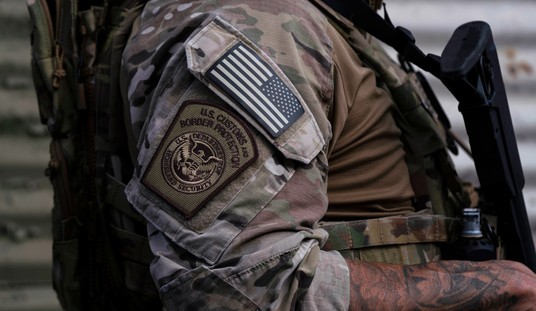
Imagine you’re a 6’2″, 220-pound man. You’re huge. You’re strong. You’re fierce. You’re more powerful than nearly everyone you see.
So you want to do the natural thing.
I’m talking, of course, about relegating yourself to violently dominating women — the average height of whom is 5’3″.
Hulk smash!
Such is the case for Hannah Mouncey, an Australian man identifying as a woman who wants to compete in Australian football — but only if it’s against girls.
Unfortunately for Hannah, there’s a fly in the ointment: The AFL doesn’t want him to.
As indicated in a video posted to Twitter, “Blessed with a mighty kicking boot,” Hannah “should’ve been a shoo-in to play at the elite level of the Aussie Rules competition.”
But someone “decided [he] was too much of a physical threat to [his] opponents.”
Watch Hannah in action here:
Australian trans athlete, Hannah Mouncey, has been vocal about policies in sport she says discriminate against trans women. pic.twitter.com/Q4bjVi8hAz
— Andy Ngô (@MrAndyNgo) November 23, 2019
In case you’re unclear on the brutal nature of Australian football, enjoy a montage of manhandling:
That’s what he wants to do to his fellow countrywomen.
But there are rules.
From a 60 Minutes Australia report:
In August, the AFL released their ‘gender diversity’ policy. It requires transgender women to stay below a certain level of testosterone. And produce informational factors including their height and weight.
Hannah believes the regulations are flat-out wrong:
“It sells women short in general. Because they’re essentially saying, you know, ‘If you’re female, you could not possibly reach this level.’ When there’s so many examples of women doing things far greater than the limits they’re setting on trans athletes.”
All of the above occurred in 2018.
He eventually withdrew his nomination from the draft.
For the time being.
But he finds the AFL’s stance “arrogant.”
In September of last year, that athlete wrote an article for The Guardian, in which he called the league’s refusal to let him play against women…well, his word choice was curious: “dangerous.”
Here’s Thor. I mean, more:
The reasons I’m critical of the AFL’s policy are not the reasons people may assume. Essentially, every physical requirement the policy asks me to meet I will. I know what I can do, and I know how I compare overall. Yet, there are still a number of issues surrounding how the policy is applied.
It is not yet clear, for example, if the data being used by the AFL to compare cis and trans women can be independently verified. Nor can we be sure the clubs have accurately reported their data. The question that has been answered by the AFL, however, is that if a trans athlete and a non-trans athlete were both to perform above average on their testing regime, the trans athlete would be excluded from AFLW, but the cis athlete wouldn’t. Not very consistent, or fair.
In his view, the AFL is just telling girls they’re fat:
My biggest concern is the fact that weight is being used as one of the key physical measures for possible exclusion. Forget the fact that in a game that has such an emphasis on endurance and speed, being heavy is not necessarily an advantage and think about the message it sends to women and girls about their bodies: if you’re too big, you can’t play. That is incredibly dangerous and backward.
It is an especially dangerous message for girls and teenagers (trans or not) who may not understand the difference between fat or muscle: they will simply get the message that being bigger is bad. If you don’t fit a certain stereotype, or possess a certain body shape, that’s bad. This is a message constantly reinforced through all types of media and the last place it needs to be coming from is sporting organisations: the very people who are currently engaged in a conscious push to increase physical activity for women and girls, which continues to lag at unhealthy rates.
Hannah’s trying to stand up for women:
That the AFL either hasn’t considered this when putting this policy together or chose to ignore it is terrible. It doesn’t take much for the seeds of lifelong body image issues to become set in a person’s mind, and with children less likely to be able to critically analyse a situation the way adults would, it is a very easy thing for a child to take the message “this person’s too big” and internalise it, turning it into “so am I”.
With so much unnecessary pressure already on girls and women about their appearance, sport should surely aspire to be a safe haven from that; a place where people’s bodies are celebrated for what they can do, rather than what they look like.
And all his chick friends are with him against the misogynistic patriarchy:
I’ve already spoken to a number of friends of mine, all cis women, about this part of the policy, and to a person their responses have been the same. The first question is always: “why does a panel of men get to decide if a woman is too big or too heavy to play football?” The irony is we know full well that our society would never tolerate a panel of women deciding if a man’s body was too small to play football.
He repeats — dangerous:
There needs to be a policy in place for trans inclusion in Australian rules football, but whether women are too heavy or too big to play once they get to a certain size should never have been a consideration. It seems as though while some of the world has moved past judging women based on their size or appearance, the AFL has not. And it’s dangerous.
Fortunately for Hannah, as per 60 Minutes, “The sport of handball has come to her rescue. Hannah’s been picked to play for Australia in the Asian championships in Japan.”
Finally — “fairness.” Watch equality triumph below.
-ALEX
Find all my RedState work here.
And please follow Alex Parker on Twitter and Facebook.
Thank you for reading! Please sound off in the Comments section below.













Join the conversation as a VIP Member